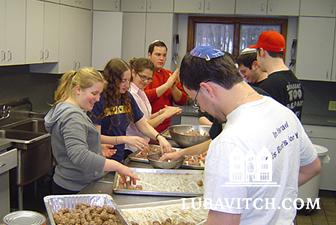eHow.com’s guide to Thanksgiving recommends starting meal preparations one month in advance. Martha Stewart, doyenne of aspiring home cooks, gave herself kudos for putting out a Thanksgiving feast for 20 people. RealSimple magazine lists 40+ ways to simplify the holiday’s preparations. It is at this point that Chabad on Campus representatives try not to snicker.
This week, Nechamie Silberberg, Chabad-Lubavitch representative at the University of Western Ontario will be serving somewhere between 175 to 250 ravenous college students. Down south at Emory University, Miriam Lipskier is prepping Shabbat dinner for the usual 130 guests. Rivkah Slonim of SUNY Binghamton’s will set Shabbat tables for hundreds, too. Chana Sara Danow at Leeds University in England just started; her “small crowd” is 37 guests this Friday night.
The idea of cooking for a dining room full of people, which sends U.S. homemakers into a flurry, a panic, and umpteen Google searches for “how to defrost a turkey” each November, is a weekly occurrence for the women of Chabad on Campus. Because of their popular Shabbat meals, they have mass food preparation down to a science. Lubavitch.com took a peek into these busy Chabad kitchens and took notes.
First thing Silberberg does when she begins cooking on Thursday is fill three 40-quart pots with water and sets them to boil. One will become soup, the others are for noodles and matza balls. “Water takes forever to boil,” she said.
Across the pond in Leeds, Darow plugs in two stand mixers to knead dough for nine challah loaves while she works on the cake batter. A set routine keeps the task manageable.
“It’s not the number of people to cook for, it’s the mind set,” said Lipskier. For many Chabad-on-Campus leaders, turning out Shabbat meals for hundreds week after week means avoiding the temptation to start too far in advance. The women of Chabad are busy, very busy, teaching, leading activities, counseling. They don’t have time nor do they want to spend the entire week cooking. Instead many devote Thursday nights to a binge of baking and cooking soups and sides and dressings. Main dishes and finishing touches are on Friday’s agenda.
That’s still a lot of time in front of a hot stove. Some chop away as they listen to Jewish lectures on CD. Quality time with kids and chatting students who volunteer fill the hours meaningfully for others.
Minimizing time needed to pull together the meal is possible with experience, the women said. Of course, there are shortcuts like buying pre-peeled potatoes, and smart moves like hiring someone to cut up the salad greens. But the right tools are invaluable. Runya Wagner’s kitchen at Chabad at USC is equipped with a commercial oven and stove.
“If you have the oven space, the stovetop space, it really cuts cooking time in half,” she said.
Underneath the covered pots, Chabad’s campus representatives negotiate a Catch-22 inherent in the meals. They cook huge dinners to give Jewish students a taste of Jewish life making it modern, relevant and fun – with a strong role for women to boot. And yet there they are, in the kitchen, for hours on end. Though the women of Chabad interviewed for this article divvied up shopping responsibilities with their rabbi husbands, and some men were the chicken and soup makers, the bulk of the work rested in feminine hands. Miriam Lipskier, who leads Torah classes during the week, delivers a Torah thought at each meal so the students remember she’s “more than a caterer.”
It’s 12:30 p.m. on Wednesday, and Rivkah Slonim isn’t worried that she has at least 300 students coming for dinner this Friday night. She’s teaching a Torah class. She and husband Rabbi Aaron Slonim have been catering to University of Binghamton students for 22 years. Serving over 70,000 pieces of chicken and preparing 30,000 gallons of chicken soup have enriched Slonim’s perspective on the work.
“We shluchos don't cook out of a love for cooking or because we consider ourselves gourmands. The meals provide the backdrop or framework for a deep experience that we believe will enrich the rest of the students’ lives,” Slonim told Lubavitch.com.
“The endeavor is its own reward! We know that with the soup and knaidlach our students are ingesting copious amounts of Jewish knowledge and feelings of pride and joy in their Jewish identity. What greater reward can there be?”

Be the first to write a comment.